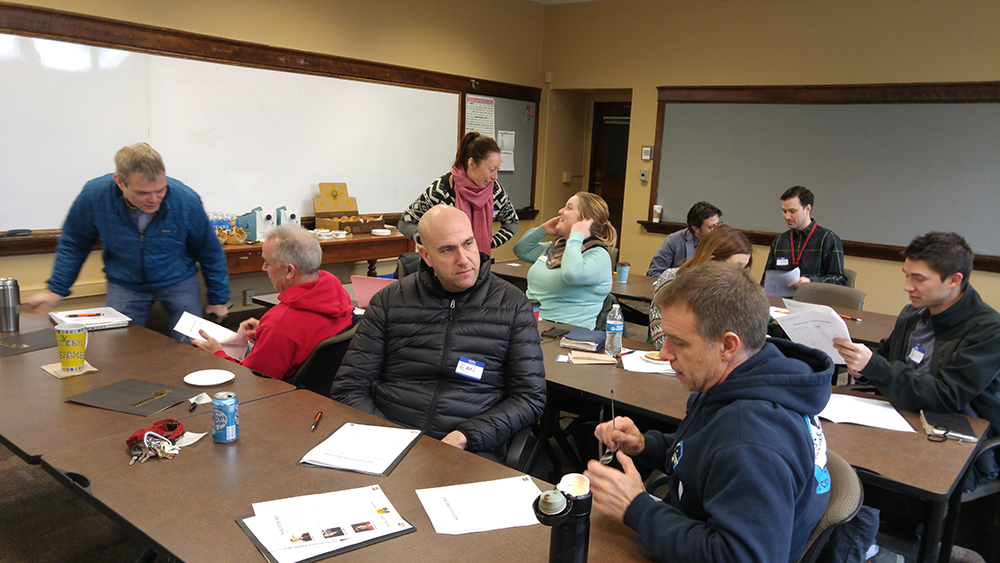Shorewood School District and the UWM Lubar Entrepreneurship Center are partnering to deliver a K12 Teaching Fellowship Program. This year-long fellowship offers Shorewood School District teachers the tools and time to design and pilot new authentic learning curriculum. Teachers would become well versed in Design Thinking methods through practice and small curriculum design experiments. Through hands-on activities and a series of design challenges, program participants (K12 Teaching Fellows) will be introduced to basic principles, tools, and mindsets of Design Thinking. This methodology for innovation that combines creative analytical approaches and collaboration across job functions and disciplines. Design Thinking draws on methods from engineering and design, and combines them with ideas from the arts, tools from the social sciences, and insights from the business practice. This program creates solutions that are user- focused and enlightens participants with new ways of being purposeful and collaborative.

FELLOWS AS COLLABORATIVE CURRICULUM DESIGNERS
The K12 Teaching Fellow Program is built on the Design Thinking process, which emphasizes empathy and relentless testing. K12 Teacher Fellows will be asked to pair-up with another K12 Fellow. This type of collaboration will help push creativity and innovation while designing new experiential curriculum.
Types of K12 Teaching Fellow partnerships might include:
Dual Course – two K12 Teaching Fellows from different backgrounds will collaborate on a new course that weaves two subjects into one course.
3 Shorewood K12 Teaching Fellowship Program Proposal August 2017
Course Intersection – two K12 Teaching Fellows of different expertise will team up to find synergies in their courses, which students will interact in some capacity.
Projects and Modules – two K12 Teaching Fellows that teach the same subject will collaborate to integrate more authentic learning projects throughout the school year.

FELLOWSHIP PROGRAM SCOPE AND FORMAT
The K12 Teaching Fellowship will be custom designed and team-taught by UWM’s Lubar Entrepreneurship Center team and UWM faculty that have been trained at the Stanford University’s Hasso Plattner Institute of Design and experienced Design Thinking curriculum creation and delivery.
Workshop #1: Taste of Design Thinking – open to teaching staff interested in the Design Thinking process. This workshop will be an introduction to various ways Design Thinking can be implemented in the classroom environment. Participants will experience content through handson Design Thinking and user-focused activities.
Workshop #2: Design Project One – Design Thinking methodology is an iterative process that relies on participants to prototype and test. Participants will be assigned their first design project, which can be a portion of a project, new behavior, or new classroom setup, that will be taught in their current class rooms. K12 Teaching Fellows will carefully observe the results.
Workshop #3: Lessons Learned and Ideation – K12 Teaching Fellows will report their lessons learned from their first design project. Fellows will be immersed in group discussion and critique. Participants will be prepped to submit a draft of a curriculum outline to implement a new project, a course overlap, or a new course for 18-19 school year.
Workshop #4: Gaining Empathy – Participants will learn and experiment with various empathy exercises (interviews, shadowing, a day in the life of, extreme users, etc.) to better inform their curriculum design. Empathy is an important tool used to understand the point-of-view from students and stakeholders (parents, coaches, school administration).
Workshop #5: Prototyping and Design Project Two – K12 Teaching Fellows will use their empathy insights to identify opportunity areas by asking “How Might We” questions and develop an abundant amount of solutions using brainstorming rules (defer judgment, go for quantity, be visual, encourage wild ideas, etc.). Participants will dive into their next iteration of a design project. Participants will be introduced to prototyping (story boards, sketches, narrative, videos, low-res prototyping) to develop the design project two. This Project will be informed by their empathy findings and will act as another form of testing of their project, class overlap, or new course.
Workshop #6: Develop Curriculum – K12 Teaching Fellows will give a synopsis of their observations during their design project two. Participants will leave the workshop with course materials (syllabus, schedule, project outlines, lesson planning, ect.) that are required for the implementation during the 18-19 school year. In addition, K12 Teaching Fellows will report what lessons have been learned throughout the program.